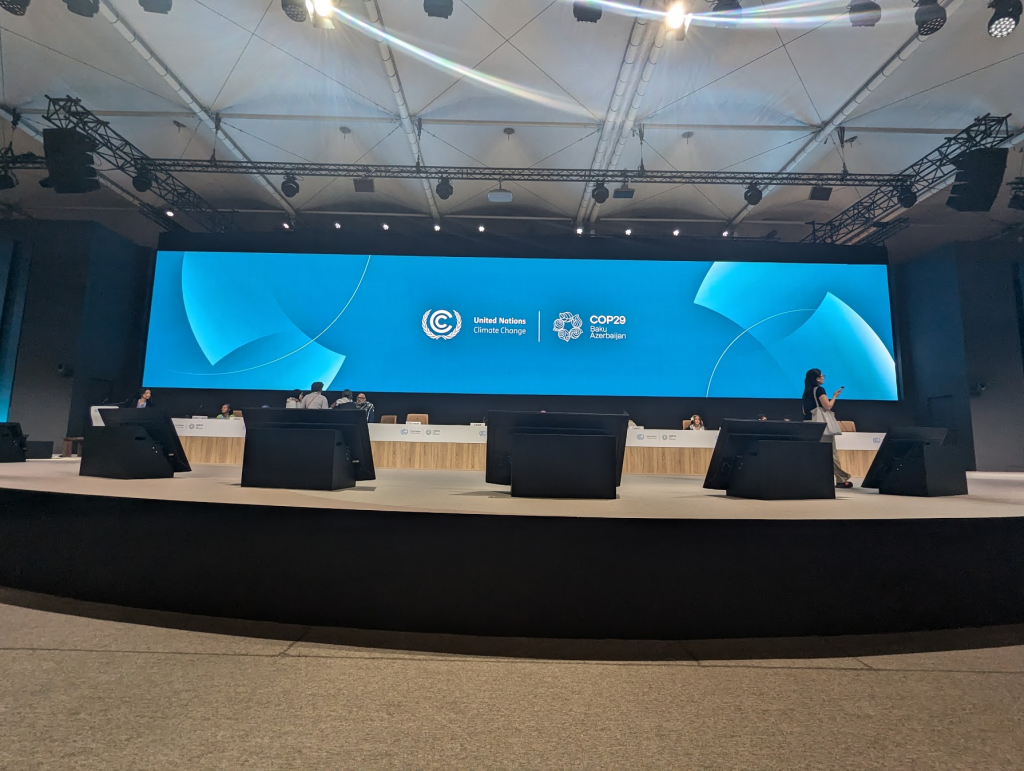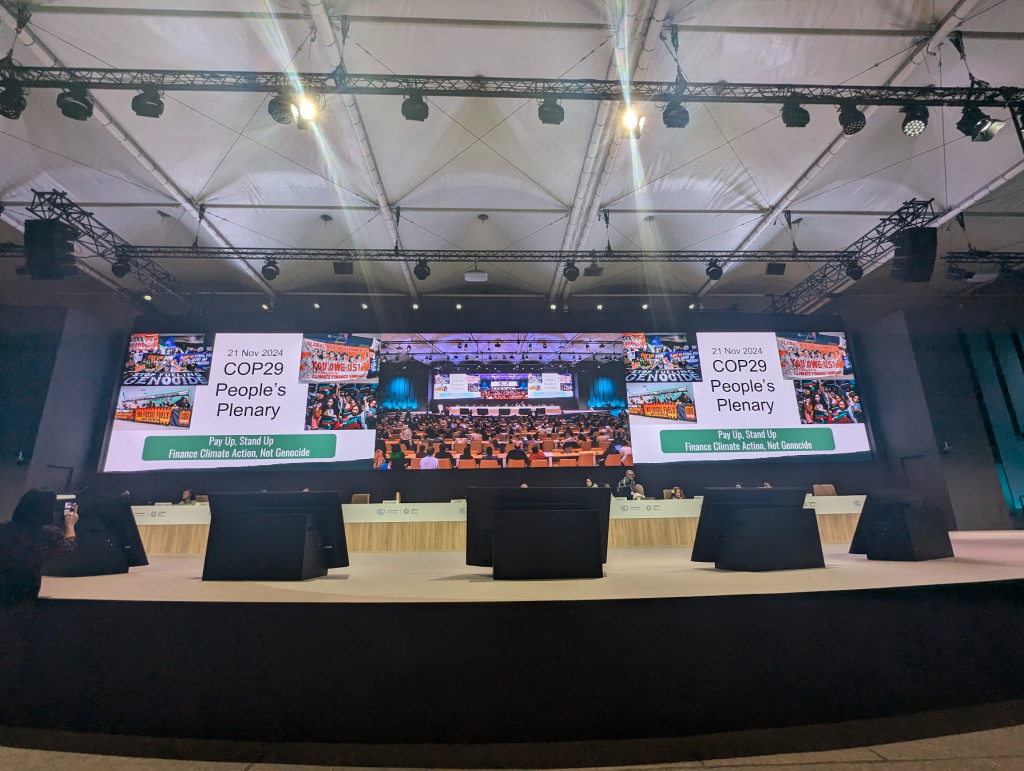On Thursday, November 21st, 2024, I attended, in my opinion, the most powerful and emotionally stirring event of Conference of the Parties-29 (COP-29) in Baku, Azerbaijan: the People’s Plenary, or the People’s COP.
Before I can discuss what I saw at this People’s Plenary, I think it is important that I address the purpose of the event. The People’s Plenary is a space where Indigenous Peoples, youth groups and delegations, including YOUNGO, women, farmers, environmental NGOs, and other activists gather together to voice their frustrations with the COP processes, but also their hope for what they believe the future can look like if large actions are taken to advance climate justice. This year, these groups called for an increase in climate finance, because COP-29 was billed as “The Finance COP”.
Given that COP was hosted in Baku, the capital of Azerbaijan, it was understood before COP began that protests and activist activity would be limited, given the repressive nature of the Azerbaijani government. I did see activists outside the Side Event rooms, but they had strict guidelines to follow, and had to conclude their presentations and clear the hall after their time-slot ended. The People’s Plenary is a forum where activists’ work is accepted and can be celebrated, and criticism can be voiced safely and heard by empathetic peers.
This event, while listed on the official UNFCCC schedule of COP, is scarcely attended by negotiators. In fact, when queueing to enter the Caspian Plenary Room, where the event was being held, those with yellow observer-designated badges had priority. This is not the case for most rooms where negotiations are held. The room filled up very quickly, with observers and side-event speakers from all over the world and from many different walks of life when the security guards finally allowed access.
On that particular day at COP-29, the official theme of the day was, “Indigenous Peoples, Gender Equality, Nature & Biodiversity, & Oceans & Coastal Zones”. However, the theme of the People’s Plenary was, “Pay Up, Stand Up: Finance Climate Action, Not Genocide”. This title accurately expressed the frustrations of the many speakers and the groups they represented, especially because many hail from the Global South, where communities disproportionately face the effects of a climate catastrophe that they did not contribute to nearly as much as corporations and governments in the Global North.
The first speakers, introduced by the Chair of the Plenary, spoke on behalf of Palestine, Lebanon, and South Sudan. All women, they expressed their anguish about the suffering their people have faced. They highlighted the compounding negative effects of climate change that threaten the lives of people whose lives are already endangered, and how war and devastation of cities likewise contribute to climate change and pollution. Each speaker conveyed her hurt and anger that the name of her respective homeland would not and could not be uttered in negotiations.
This resonated with me deeply, as an Armenian-American woman. My grandfather’s family fled Armenian when my grandfather, John Kerimian, and his twin brother, Ray Kerimian, were infants, and his sister, Jacqueline Kerimian, was a young teenager. Currently, there are more Armenians living in diaspora than in Armenia. Recently, millions of indigenous Armenians living in Artsakh, or Nagorno Karabakh, were forced to leave their homeland when Azerbaijan asserted that the territory belonged to them and occupied the region. In the halls of the Conference of the Parties-29, I did not hear anyone mention Armenia either.
The introduction of the People’s Plenary provoked deep emotions within me. As I wiped away tears, I made eye contact with the women around me, and felt a sense of solidarity and understanding pass between us. The mood of the rest of the Plenary, though, was more fiery, with attendees calling for “Trillions, Not Billions”, referring to the New Collective Quantified Goal (NCQG). The NCQG is a target established in the Paris Agreement in 2015, which was formerly 100 billion USD. The purpose of the NCQG is to raise climate finance for developing countries, which can help these nations fund mitigation efforts, adapt to climate change, and recover when natural disasters destroy industries and displace people.
One of the speakers that I found very riveting, was an activist fighting in the larger Global Climate Justice Movement. He spoke passionately and emphasized that the struggle for climate justice is inextricably linked to the global push to end genocides and wars. This intersectionality was not unknown to me, but hearing it stressed at a prestigious conference was empowering. Sitting in that vast room, I thought of the work of my peers and my own environmental justice work, and felt a wave of resolve to continue advocating for and standing with people being unfairly harmed by climate change pass through me.
At the end of the Plenary, citizens of the Global North were called to stand and recite a pledge to support the Global South and push for justice wherever and whenever, no matter what. Now COP has ended, and the NCQG was actually set at 300 billion USD, when nations from the Global South stated that 1.3 trillion would be needed to combat climate change. While it may seem like this would be devastating to the attendees of the People’s Plenary, I suspect they will maintain their hope, passion, and action, and continue to push for climate action.
Overall, I am grateful that I was able to attend COP-29, and attend the People’s Plenary. It will be a memory I cherish for a long time, especially as I plan to attend law school, and persist in my activism.

